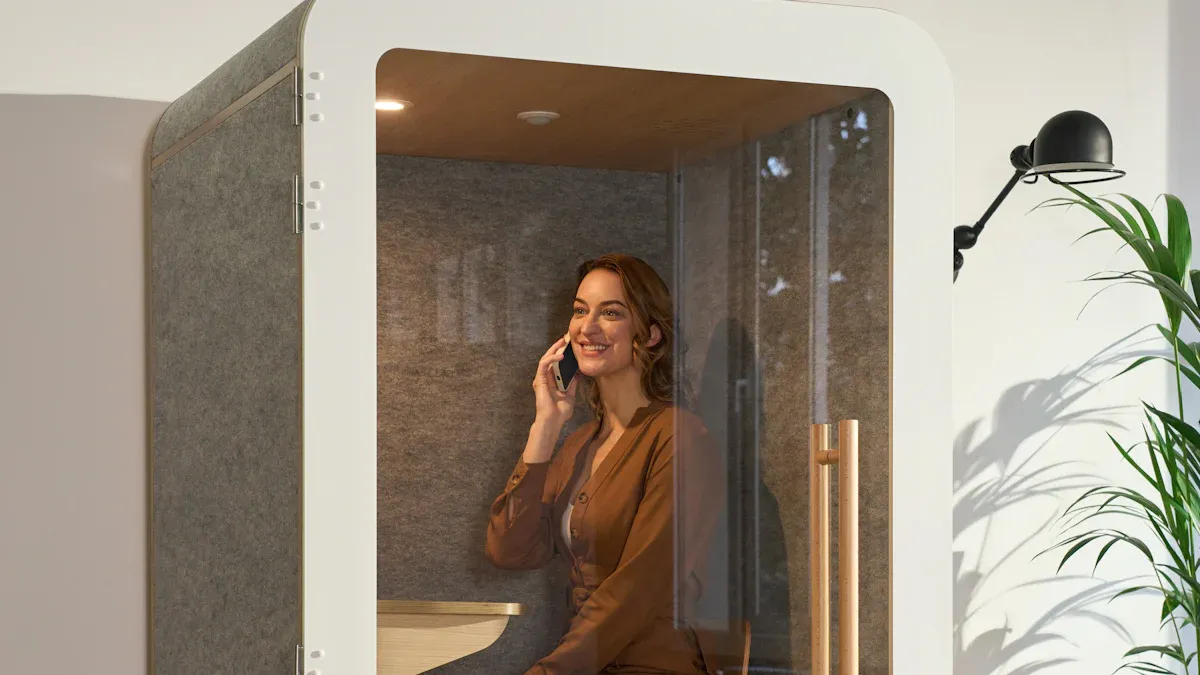
يصرف الضوضاء ما يقرب من 70% من عمال المكاتب، غالبًا ما تسبب فقدان ما يصل إلى 66% في الإنتاجية. جراب اجتماع كشك الهاتف يحجب ما يصل إلى 33 ديسيبل من الصوت، مساعدة الفرق في استعادة التركيز. 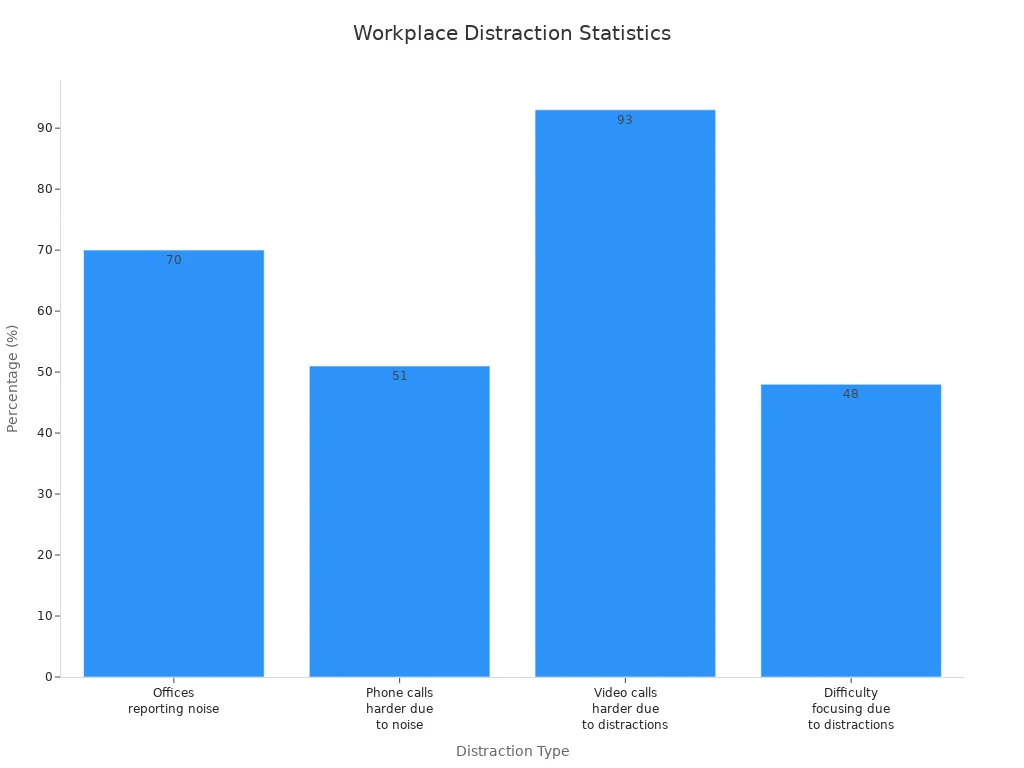 يختار الكثيرون أ كشك الهاتف الصامت أو مقصورات استدعاء للمكتب لإنشاء خاص مكتب كشك الهاتف منطقة.
يختار الكثيرون أ كشك الهاتف الصامت أو مقصورات استدعاء للمكتب لإنشاء خاص مكتب كشك الهاتف منطقة.
فهم جراب اجتماع كشك الهاتف
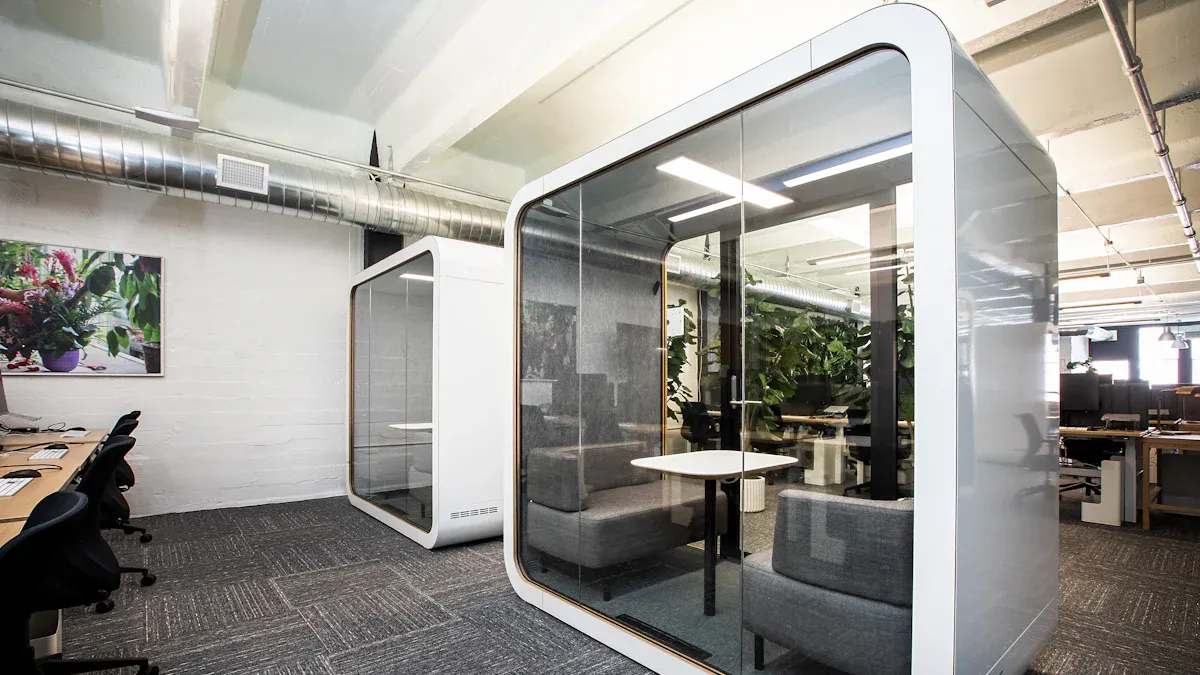
الميزات الرئيسية والتصميم
تقدم قرون اجتماع كشك الهاتف الحديثة مجموعة من الميزات التي تدعم كل من الخصوصية والإنتاجية في مكان العمل. الشركات تصمم هذه القرون لتناسب الاحتياجات المختلفة ، من مقصورات شخص واحد للمكالمات الخاصة إلى قرون الاجتماعات متعددة الأشخاص مزودة بتكنولوجيا AV لمناقشات الفريق. تستخدم العديد من النماذج البناء المعياري ، مما يسمح بسهولة النقل والتخصيص لمطابقة ديكور المكاتب.
تشمل بعض الميزات الشائعة:
- عزل الصوت المتقدم للمحادثات السرية
- أنظمة التهوية المتكاملة للهواء النقي
- إضاءة LED مع سطوع قابل للتعديل
- خيارات الجلوس المريحة وخيارات المكتب
- منافذ الطاقة ومنافذ USB ومحطات الشحن اللاسلكية
- الشاشات الرقمية المدمجة واتصال الإنترنت عالي السرعة
- شاشات الخصوصية والتشطيبات القابلة للتخصيص
| ميزة | وصف |
|---|---|
| عزل الصوت | عزل صوتي يصل إلى 25-40 ديسيبل للخصوصية والحد من الضوضاء |
| تهوية | أنظمة تدفق الهواء النقي للراحة |
| إضاءة | إضاءة LED قابلة للتعديل للرؤية |
| القوة والاتصال | المنافذ ومنافذ USB لشحن الجهاز |
| خيارات الجلوس ومكتب | تكوينات مريحة للراحة والإنتاجية |
| الميزات التكنولوجية | الشاشات الرقمية والإنترنت والشحن اللاسلكي |
| التخصيص | خيارات التصميم والمواد لتعكس هوية العلامة التجارية |
كيف تقلل قرون اجتماع كشك الهاتف من ضوضاء المكتب
تستخدم جراب اجتماع كشك الهاتف طبقات متعددة من المواد الصوتية ، مثل ألياف البوليستر ، لامتصاص الصوت ومنع الضوضاء الخارجية. تساعد أحزمة الختم المزدوجة على الأبواب والحواف الزجاجية ، إلى جانب مواد التخفيف بين الجراب والأرض ، في تقليل تسرب الصوت. يحافظ الزجاج المغطى على الشفافية مع توفير العزل الصوتي.
تشير الدراسات العلمية إلى أن هذه القرون يمكن أن تقلل من الضوضاء بمقدار 27 إلى 33 ديسيبل ، حيث تلتقي معايير ISO 23351-1: 2020 لخصوصية الكلام. هذا المستوى من الحد من الضوضاء يخلق أ منطقة هادئة للعمل المركّز والاجتماعات السرية.
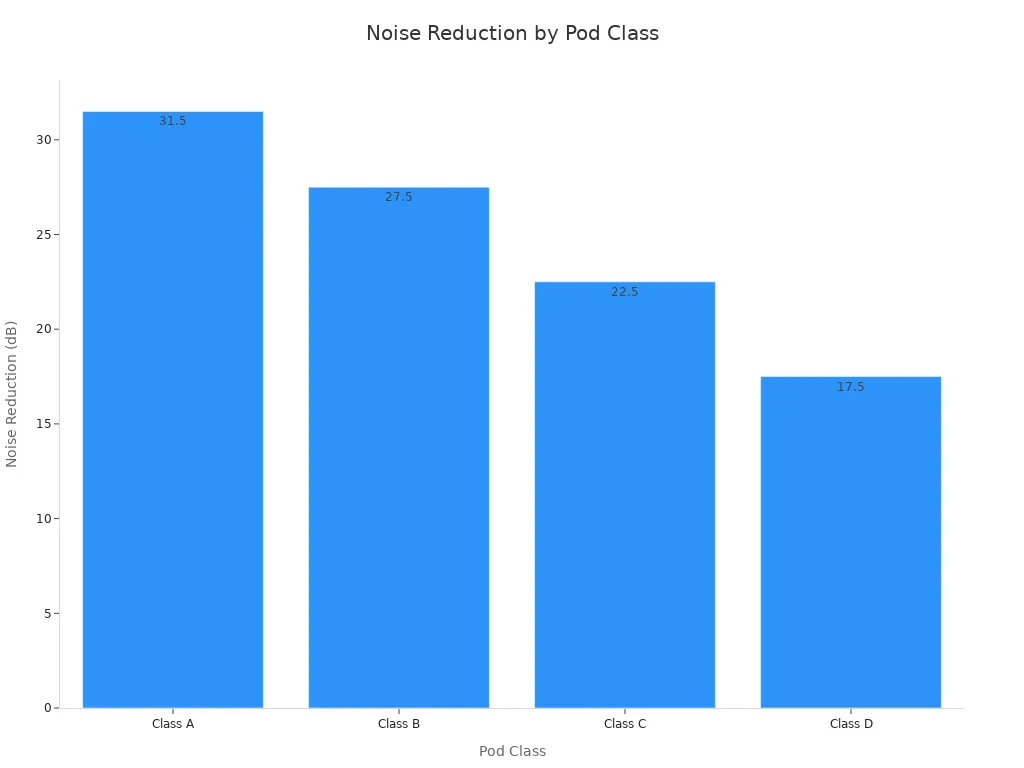
تتميز القرون أيضًا بنظام ضوابط متكاملة للتهوية والإضاءة ، مما يضمن الراحة أثناء الاستخدام. هُم تصميم وحدات يسمح بوضع مرن ، مما يجعلها حلاً عمليًا لتلبية احتياجات المكاتب المتطورة.
اختيار أفضل جراب اجتماع كشك الهاتف لمكتبك
اعتبارات الحجم والقدرة
اختيار الحجم المناسب بالنسبة لاجتماع كشك الهاتف ، يعتمد قرنة المكتب على احتياجات المكتب والمساحة المتاحة. تأتي القرون في عدة أحجام:
- تناسب القرون الصغيرة شخصًا واحدًا وتعمل بشكل جيد للمكالمات الخاصة أو مؤتمرات الفيديو.
- تستوعب القرون المتوسطة شخصين إلى أربعة أشخاص ، مما يجعلها مثالية للاجتماعات الصغيرة أو العمل الجماعي المركّز.
- مجموعات دعم القرون الكبيرة التي تصل إلى ثمانية ، توفر مساحة للجلسات التعاونية.
يجب أن تنظر الفرق في عدد المرات التي تحدث فيها الاجتماعات وعدد المستخدمين وأنواع الأنشطة المخطط لها داخل القرنة. يزيد الموضع بالقرب من محطات العمل من الراحة ، في حين أن التحليلات في استخدام غرفة الاجتماعات يمكن أن تساعد في تحديد الكمية والحجم المناسبين. ميزات إمكانية الوصول ، مثل الوصول إلى الكراسي المتحركة والأثاث القابل للتعديل ، تحسين قابلية الاستخدام للجميع.
خيارات العزل والخصوصية
فعال تسرب الصوت يضمن الخصوصية ويقلل من الانحرافات. تستخدم القرون الرائدة مواد صوتية متقدمة وبناء متعدد الطبقات. يسلط الجدول أدناه الضوء على تقنيات التسرب الصوتي الرئيسية:
| ميزة | وصف |
|---|---|
| التصميم الصوتي | بناء وحدات مع مواد صوتية من الدرجة العسكرية |
| الحد من الضوضاء | يقلل الضوضاء بمقدار 25-45 ديسيبل، دعم المحادثات السرية |
| نظام التهوية | يدور الهواء بهدوء ، والحفاظ على الراحة وعزل الصوت |
| ألواح زجاجية | زجاج مخفف أو مغلور من أجل السلامة وعزل الصوت |
| ميزات الخصوصية | لوحات قابلة للتخصيص وأنظمة إخفاء الصوت وتدفق الهواء السائل |
غالبًا ما تتضمن القرون ميزات ذكية مثل أجهزة استشعار الحركة وإضاءة LED وشاشات الخصوصية لتعزيز السرية.
تكامل الراحة والتكنولوجيا
تلعب الراحة والتكنولوجيا دورًا حيويًا في رضا المستخدم. وتشمل الميزات الأساسية:
- مقاعد مريحة مع مسند الظهر والمكاتب القابلة للتعديل
- منافذ الطاقة المتكاملة ومنافذ USB واتصال Wi-Fi
- إضاءة LED محسنة لمكالمات الفيديو
- تهوية الضغط الإيجابية للهواء النقي
- أجهزة استشعار الإشغال وعناصر تحكم اللمس للإعدادات الشخصية
توفر بعض القرون المناور للضوء الطبيعي وإغلاق الأبواب المغناطيسية للدخول الهادئ. تخلق هذه الميزات بيئة مثمرة وخالية من الهاء تدعم كل من العمل الفردي والمجموع.
التخطيط لتخطيط المناطق الهادئة
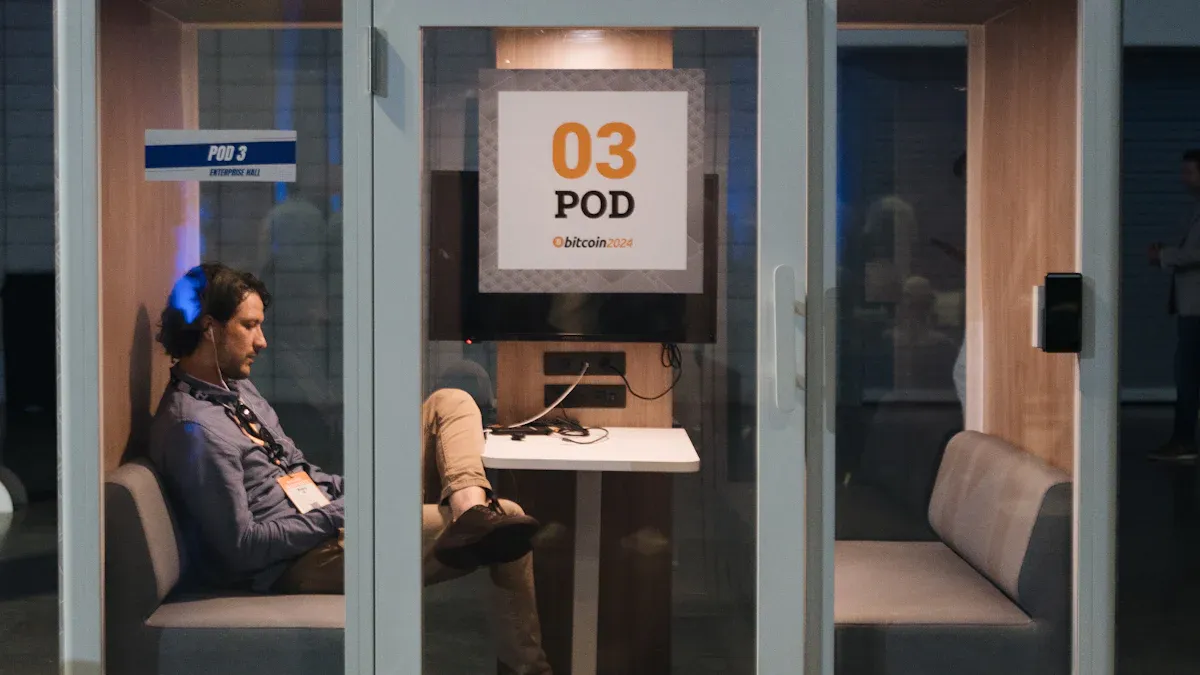
الموضع الاستراتيجي لجرائم اجتماع كشك الهاتف
الموضع الاستراتيجي للقرون يشكل فعالية المناطق الهادئة. وضع القرون بالقرب من مناطق العمل المشتركة ، ولكن بعيدًا عن الممرات المزدحمة ، يقلل من الانحرافات والازدحام. هذا النهج يحسن إمكانية الوصول ويقلل من تعطيل الضوضاء. تستخدم العديد من المكاتب عناصر تصميم خفية ، مثل الأرضيات أو الإضاءة المختلفة ، لتحديد المناطق الهادئة بصريًا. مواد ناعمة مثل السجاد والنباتات والألواح الصوتية تمتص الصوت وتخلق جوًا هادئًا.
نصيحة: وضع القرون في المواقع التي توازن الخصوصية والراحة. تجنب حظر مخارج الطوارئ أو الممرات الرئيسية.
يمكن وضع القرون مع HVAC المتكاملة ، وترشيح الهواء ، وإضاءة مستشعر الحركة في أي مكان في المكتب. هذه الميزات تدعم الراحة وتقليل الضوضاء المستمر. يضمن الامتثال للمعايير الصوتية ، مثل ISO 23351-1 ، العزلة الصوتية الفعالة وخصوصية الكلام. تؤكد الشهادات من الشركات أن التنسيب المدروس وتحسين العزل الصوتي يؤدي إلى تحسين الإنتاجية وعدد أقل من الانقطاعات.
أفضل الممارسات للتوظيف الاستراتيجي:
- تعيين مناطق العمل الهادئة باستخدام العظة المرئية.
- استخدم قرون معيارية ، قائمة بذاتها للمرونة.
- تعزيز آداب المكتب مع سماعات إلغاء الضوضاء وساعات هادئة.
- امزج المناطق الهادئة ، والقرون المغلقة ، والمساحات المشتركة لدعم أنماط العمل المختلفة.
التكامل مع أثاث المكاتب الحالي
دمج القرون مع الأثاث الحالي يزيد من كفاءة المساحة. تتميز معظم القرون بتصميم وحدات مضغوط. هذا يسمح لهم بالتناسب مع تخطيطات المكاتب دون تحريك الأثاث أو إجراء تغييرات دائمة. تأتي القرون في تكوينات مختلفة ، مثل أكشاك الهاتف ، والقرون المتجانسة ، وقاعات الاجتماعات ، لتلبية الاحتياجات المختلفة.
- القرون الهاتف المحمول ومرنلا تتطلب بناء دائم.
- أنها تحول مكاتب المخطط المفتوح من خلال توفير مساحات مركزة وتعاونية.
- خيارات التخصيص تساعد القرون على الاندماج مع ديكور المكتب الحالي.
- تتيح التصميمات المعبأة المسطحة التجميع السهل في الموقع، تقليل الاضطراب.
- تعزز مواد امتصاص الصوت والتهوية واتصالات الطاقة المتكاملة الوظائف.
ملاحظة: تثقيف الموظفين حول استخدام POD لتعزيز الاستخدام الفعال ودعم كفاءة الفضاء.
تحتل جراب اجتماع كشك الهاتف بصمة أصغر من غرف الاجتماعات التقليدية. هذا يعمل على تحسين استخدام المساحة بشكل عام ويدعم نماذج العمل الهجينة. يمكن للموظفين الوصول إلى المساحات الخاصة بسرعة ، وتحسين سير العمل والحفاظ على تصميم مكتب متماسك.
ضمان إمكانية الوصول وتدفق المكتب
إمكانية الوصول وتدفق المكاتب ضرورية لمساحة عمل وظيفية. يجب ألا تمنع القرون المسارات الرئيسية أو مخارج الطوارئ. الحفاظ على الممرات ثلاثة أقدام على الأقل حول القرون. موقف الموقف حتى يتمكن الجميع من الوصول إليها بسهولة ، بما في ذلك أولئك الذين يستخدمون أجهزة التنقل.
إرشادات لضمان إمكانية الوصول والتدفق:
| خطوة | فعل |
|---|---|
| 1 | تحديد المسارات الرئيسية وأنماط الحركة اليومية. |
| 2 | تجنب حظر مخارج الطوارئ أو إنشاء اختناقات. |
| 3 | النظر في احتياجات الوصول إلى ما وراء الامتثال لإدراج. |
| 4 | الحفاظ على ممرات واضحة حول القرون. |
| 5 | ضع القرون بالقرب من الحمامات وكسر المناطق للراحة. |
تدعم القرون ذات الأبواب المنزلق أو مقابض سهلة الاستخدام إمكانية الوصول. تستوعب المكاتب والكراسي القابلة للتعديل داخل القرون احتياجات المستخدم المتنوعة. تساعد قواعد الاستخدام الواضحة ، مثل تحديد الغرض من كشك وتحديد الحدود الزمنية ، في الحفاظ على تدفق المكتب. يمكن لنظام الحجز منع النزاعات إذا كان الطلب مرتفعًا. مراجعة القواعد وتكييفها بانتظام بناءً على ملاحظات الفريق للحفاظ على PODS وظيفية ومتكاملة بشكل جيد.
تعظيم الإنتاجية مع قرون اجتماع كشك الهاتف
تحديد إرشادات استخدام واضحة
إرشادات واضحة ساعد الجميع على استخدام قرون الاجتماع بشكل عادل وكفاءة. غالبًا ما تحدد المكاتب الغرض من كل جراب لمنع الارتباك. قواعد الحجز ، والحدود الزمنية ، والإشغال ، والضوضاء ، والنظافة تبقي المساحة منظمة. تنشر العديد من الشركات هذه القواعد بالقرب من القرون أو تشاركها في كتيبات الموظفين.
نصيحة: تقلل القواعد المتسقة من الإحباط وتأكد من إمكانية الوصول إلى كل شخص عند الحاجة.
قد تتضمن مجموعة بسيطة من القواعد:
- الحفاظ على الأصوات منخفضة احترام تركيز الآخرين.
- استخدم POD فقط للغرض المقصود.
- التزم بفتحة الوقت المحجوزة.
- تنظيف بعد كل استخدام.
- أطفئ الأضواء والتهوية عند المغادرة.
أنظمة الجدولة والحجز
أنظمة الجدولة الفعالة تمنع الحجوزات المزدوجة والوقت الضائع. تستخدم العديد من المكاتب منصات رقمية تظهر توفر الوقت الفعلي. غالبًا ما تتصل هذه الأنظمة بأدوات البريد الإلكتروني وأدوات التقويم ، مما يجعل من السهل حجز جراب وإرسال دعوات الاجتماع. تقدم بعض المنصات ، مثل Flydesk ، تطبيقات لحجز القرون والمكاتب ، ودعم نماذج العمل المرنة.
ملاحظة: يمكن أن تظهر شاشات العرض خارج القرون الحجوزات الحالية والقادمة ، مما يساعد المستخدمين في العثور على المساحات المتاحة بسرعة.
تتيح أنظمة الحجز المركزية أيضًا للمديرين التحكم في أنماط الوصول ومراقبة أنماط الاستخدام. هذا يساعد على تحقيق التوازن بين العرض والطلب ، وضمان الوصول العادل لجميع الفرق.
الحفاظ على النظافة والراحة
نظيفة و جراب مريح يدعم الإنتاجية والرفاهية. تشجع المكاتب المستخدمين على الترتيب بعد كل جلسة وإزالة العناصر الشخصية. جداول التنظيف العادية تبقي القرون جديدة وجذابة.
نصيحة: اختر الجلوس وضبط التهوية للراحة ، خاصة خلال الاجتماعات الطويلة.
قائمة مراجعة بسيطة للمستخدمين:
- امسح الأسطح بعد الاستخدام.
- إزالة القمامة والممتلكات الشخصية.
- أغلق الباب بلطف لتجنب الضوضاء.
- الإبلاغ عن أي مشكلات الصيانة على الفور.
تساعد هذه العادات في الحفاظ على بيئة ترحيبية للجميع.
فوائد المناطق الهادئة التي تم إنشاؤها بواسطة قرون اجتماع كشك الهاتف
التركيز والتركيز المعزز
مناطق هادئة مساعدة الموظفين على استعادة التركيز وتقليل الانحرافات. تظهر الأبحاث أن انقطاع مكان العمل يمكن أن يقلل الإنتاجية بما يصل إلى 40%. يفقد عمال المعرفة أكثر من ساعتين كل يوم بسبب الضوضاء والانقطاع. تكشف دراسات من Harvard Business Review و Steelcase أن معظم الموظفين يحتاجون إلى مساحات هادئة ، لكن الكثير منهم لا يمكنهم الوصول. الشركات التي تنشئ مناطق هادئة ترى شكاوى ضوضاء أقل وإنتاجية أعلى. على سبيل المثال:
- يخسر الموظفون 86 دقيقة يوميًا للانحرافات في المكاتب المفتوحة.
- يمكن للمناطق الهادئة أن تعزز الإنتاجية بما يصل إلى 25% للمهام التي تتطلب تركيزًا عميقًا.
- بعد تثبيت عزل الصوت ، 78% من الشركات الإبلاغ عن تركيز أفضل.
تساعد المناطق الهادئة للموظفين على استعادة التركيز بشكل أسرع ، مما يؤدي إلى جودة عمل أفضل وتوتر أقل.
تحسين الخصوصية للمكالمات والاجتماعات
غالبًا ما تفتقر المكاتب المفتوحة إلى الخصوصية ، مما يجعل المحادثات السرية صعبة. توفر قرون الاجتماع مساحة خاصة وهادئة بعيدًا عن الانحرافات. يشعر الموظفون بمزيد من الثقة والأمان عندما يعرفون أن محادثاتهم لا ترمع. تستخدم هذه القرون طبقات متعددة من عزل الصوت ، وأختام الأبواب الضيقة ، والزجاج الصوتي للحفاظ على محادثات خاصة. كما أنها توفر مساحات مرنة لكل من المكالمات الفردية واجتماعات المجموعة. هذه الخصوصية تقلل من التوتر ويدعم التواصل المهني.
تعاون أفضل ورفاه الموظف
تدعم المناطق الهادئة العمل الجماعي وصحة الموظفين. تشير الدراسات إلى أن الموظفين في المكاتب المفتوحة يواجهون المزيد من الانحرافات ويأخذون المزيد من الإجازة المرضية. توفر القرون الصوتية مساحات خاصة للاتصالات وجهاً لوجه أو الهاتف ، وهو أكثر فاعلية من البريد الإلكتروني. يبلغ الموظفون عن ضغوط أقل ورضا أعلى عندما يكون لديهم إمكانية الوصول إلى مساحات هادئة ومريحة. الميزات المريحة والإضاءة الجيدة والتهوية في القرون تعمل على زيادة تحسين الرفاه ودعم التعاون.
يقوم اجتماع كشك الهاتف بتحويل بيئات المكاتب عن طريق إنشاء مناطق هادئة ومنتج.
- يبلغ الموظفون التركيز والخصوصية بشكل أفضل.
- تستخدم شركات مثل Toyota و Nestlé قرون للاجتماعات السرية والتعاون.
| فائدة | تأثير |
|---|---|
| تثبيت سريع | لا تأخير البناء |
| استخدام مرن | يزيد المساحة وعائد الاستثمار إلى الحد الأقصى |
التعليمات
كم من الوقت يستغرق تثبيت جراب اجتماع كشك الهاتف؟
تكمل معظم الفرق التثبيت في غضون ساعات قليلة. تصميمات وحدات السماح للتجميع السريع دون اضطرابات كبيرة في أنشطة المكاتب اليومية.
هل يمكن نقل قرون مقابلة كشك الهاتف بسهولة؟
نعم. يمكن للفرق نقل القرون المعيارية إلى مواقع جديدة مع تغيير المكاتب. مواد خفيفة الوزن وتجميع بسيطة تجعل النقل واضحًا.
ما هي الصيانة التي تتطلبها قرون اجتماع كشك الهاتف؟
تنظيف منتظم وفحوصات عرضية لـ التهوية والإضاءة والأختام الحفاظ على القرون في الأعلى. يجد معظم المستخدمين الصيانة بسيطة ويمكن التحكم فيها.

